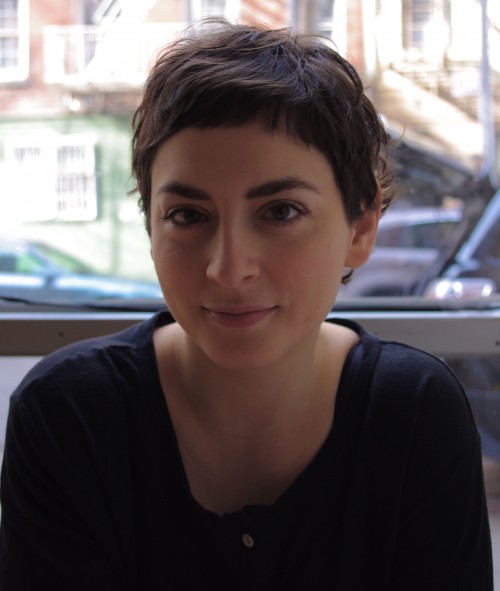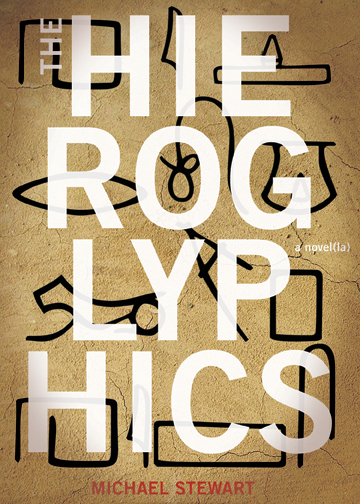This Wednesday, at 9 PM EASTERN (that’s 6 on the west coast), we’ll have the return of the Live Giants online reading series for 2011, beginning with the fantastic double header of Noah Eli Gordon & Sommer Browning, in support of their new books The Source & Either Way I’m Celebrating. As always, all you gotta do is show up here at the site. You can RSVP at Facebook here and we’ll remind you. Two fantastic poets in your living room live. Don’t miss it.
What is Experimental Literature? {Five Questions: Kate Zambreno}

Kate Zambreno is the author of O Fallen Angel, which won Chiasmus Press’ “Undoing the Novel—First Book Contest.” Another novel, Green Girl, will be published by Emergency Press in Fall 2011. A nonfiction book revolving around the women of modernism, Heroines, will be published by Semiotext(e)’s Active Agents series in Fall 2012. She writes the blog Frances Farmer is My Sister. She is also an editor at Nightboat Books. Currently she is curating a series called Prose Event for the Belladonna* Collaborative, which examines the intersection of fiction and the essay. The next Prose Event will be on May 17 at Dixon Place in NYC and will feature Amina Cain, Danielle Dutton, and Renee Gladman.
13 ways of looking at Michael Stewart: An Interview
Back in 2001, I took my very first fiction workshop. It was with Catherine Kasper. I’d never written a short story before. I was a junior. My first story submission was terrible, truly terrible.
Despite my really shitty story, Michael Stewart was nice to me.
I thought he was the best writer in class. (And he was.) And there were some spectacular writers in class.
Over the past decade, Michael and I have consumed a lot of coffee and breakfast tacos together. We have played many chess games and go games. We have seen each other’s heartbreaks and victories.
Michael Stewart is a charming man and a charming writer. His first book, The Hieroglpyhics, is out now (and can be purchased here) with Mud Luscious Press.
Interview Roundup Part Seven: Whitehead, Klima, Krilanovich, Touré, Roy
 “My whole life I’ve seen those elevator inspection certificates. I’d go to school, when I was a kid, and come back and the person had been there, the exact same guy for 10 years. The elevator seemed perfectly fine, so what’d he do? I was thinking about what would make a funny detective story. Well, why not put this person in a situation where he actually has to apply his esoteric skills to a straightforward mystery? But then I had to actually make up what kinds of skills he had, and it became all about elevators and not so much this chase-the-McGuffin sort of story.” – Colson Whitehead, in Salon
“My whole life I’ve seen those elevator inspection certificates. I’d go to school, when I was a kid, and come back and the person had been there, the exact same guy for 10 years. The elevator seemed perfectly fine, so what’d he do? I was thinking about what would make a funny detective story. Well, why not put this person in a situation where he actually has to apply his esoteric skills to a straightforward mystery? But then I had to actually make up what kinds of skills he had, and it became all about elevators and not so much this chase-the-McGuffin sort of story.” – Colson Whitehead, in Salon
 “I said something simple about the situation and there was tremendous applause. The strange thing was that afterwards many people came up and said that they had not known I was living in Prague all these years. Blacklisted writers had been made non-existing persons by the regime. People thought we lived in exile; in a way we did.” – Ivan Klima, in The Guardian
“I said something simple about the situation and there was tremendous applause. The strange thing was that afterwards many people came up and said that they had not known I was living in Prague all these years. Blacklisted writers had been made non-existing persons by the regime. People thought we lived in exile; in a way we did.” – Ivan Klima, in The Guardian
 “Oh yes, I explicitly used cutups for this novel. Lots and lots, especially during the big push, the heavy lifting that took place in ’06. And I’m talking cutups in the classic Burroughs/Gysin sense, two texts sliced down lengthwise and reattached with their opposites: AA and BB become AB and BA. Then you strike out the word fragments caught in between so it looks like a crooked seam. They’re great aesthetic objects, just on their own. You may notice a few words and scenarios in the OEC crop up again and again—I think some of the sections involving day laborers—and that’s the residue of the cutups. Eventually I rewrote things so much that the effect was mostly obliterated, but it did help generate content, which was my reason for doing them. I wanted to come up with ideas that I couldn’t simply conjure up through ordinary means—out of thin air, the old fashioned way.” – Grace Krilanovich in Hobart
“Oh yes, I explicitly used cutups for this novel. Lots and lots, especially during the big push, the heavy lifting that took place in ’06. And I’m talking cutups in the classic Burroughs/Gysin sense, two texts sliced down lengthwise and reattached with their opposites: AA and BB become AB and BA. Then you strike out the word fragments caught in between so it looks like a crooked seam. They’re great aesthetic objects, just on their own. You may notice a few words and scenarios in the OEC crop up again and again—I think some of the sections involving day laborers—and that’s the residue of the cutups. Eventually I rewrote things so much that the effect was mostly obliterated, but it did help generate content, which was my reason for doing them. I wanted to come up with ideas that I couldn’t simply conjure up through ordinary means—out of thin air, the old fashioned way.” – Grace Krilanovich in Hobart
 “Early on there was an assumption from editors that I could write about hip-hop and black music but not about white music. Once an editor suggested I’d be lost writing about Eric Clapton, which is strange because he’s steeped in black music. I just kept fighting and I found white subjects who others didn’t want to cover and did them well. In time my editors realized I could write about anything.” – Touré in No Strings Attached News
“Early on there was an assumption from editors that I could write about hip-hop and black music but not about white music. Once an editor suggested I’d be lost writing about Eric Clapton, which is strange because he’s steeped in black music. I just kept fighting and I found white subjects who others didn’t want to cover and did them well. In time my editors realized I could write about anything.” – Touré in No Strings Attached News
 “I don’t see a great difference between The God of Small Things and my works of nonfiction. As I keep saying, fiction is truth. I think fiction is the truest thing there ever was. My whole effort now is to remove that distinction. The writer is the midwife of understanding. It’s very important for me to tell politics like a story, to make it real, to draw a link between a man with his child and what fruit he had in the village he lived in before he was kicked out, and how that relates to Mr. Wolfensohn at the World Bank. That’s what I want to do. The God of Small Things is a book where you connect the very smallest things to the very biggest: whether it’s the dent that a baby spider makes on the surface of water or the quality of the moonlight on a river or how history and politics intrude into your life, your house, your bedroom.” – Arundhati Roy in The Progressive
“I don’t see a great difference between The God of Small Things and my works of nonfiction. As I keep saying, fiction is truth. I think fiction is the truest thing there ever was. My whole effort now is to remove that distinction. The writer is the midwife of understanding. It’s very important for me to tell politics like a story, to make it real, to draw a link between a man with his child and what fruit he had in the village he lived in before he was kicked out, and how that relates to Mr. Wolfensohn at the World Bank. That’s what I want to do. The God of Small Things is a book where you connect the very smallest things to the very biggest: whether it’s the dent that a baby spider makes on the surface of water or the quality of the moonlight on a river or how history and politics intrude into your life, your house, your bedroom.” – Arundhati Roy in The Progressive
Everyday Draft Crow Bomb Lolita King Rattling

1. I haven’t closed in my browser this piece by Kristen Iskandrian at Everyday Genius since it was published about three weeks ago.
2. Draft: a journal of process is a new magazine that shows author’s revision processes in crafting a piece. The first issue contains versions of work by Mary Miller and Greg Hrbek; a really interesting twist on a vision at the way a thing becomes.
3. In Portland, a new artists community has opened, Crow Arts Manor, offering gallery space, workshops, readings, and a lot more.
4. Bomb’s 2011 Fiction Contest is now accepting submissions, judged by Rivka Galchen.
5. At the Observer, a review of Tiger, Tiger by Margot Fragoso, a book about “a real life Lolita” & radio-centric speed dating.
6. Coming up in Beverly Hills, CA: PEN Center USA will present THE PALE KING: MONOLOGUES FROM THE UNFINISHED NOVEL BY DAVID FOSTER WALLACE at the Saban Theatre in Beverly Hills on April 28, 2011. Doors will open at 7PM with a cocktail reception. To purchase tickets contact The Saban Theatre Box Office, Tuesday through Friday 12:00pm – 5:00pm; Phone: 323-655-0111.
7. And in Los Angeles, a release party for the debut issue of a new magazine, The Rattling Wall: PEN Center USA and Narrow Books at the Hammer Museum on May 11, 2011 at 7PM for the release of The Rattling Wall, a literary journal specializing in short fiction, travel essays, and poetry.
Interview Roundup Part Six: Kundera, Egan, Dawson, Endo, Simmons
 “Musil and Broch saddled the novel with enormous responsibilities. They saw it as the supreme intellectual synthesis, the last place where man could still question the world as a whole. They were convinced that the novel had tremendous synthetic power, that it could be poetry, fantasy, philosophy, aphorism, and essay all rolled into one. In his letters, Broch makes some profound observations on this issue. However, it seems to me that he obscures his own intentions by using the ill-chosen term “polyhistorical novel.” It was in fact Broch’s compatriot, Adalbert Stifter, a classic of Austrian prose, who created a truly polyhistorical novel in his Der Nachsommer [Indian Summer], published in 1857. The novel is famous: Nietzsche considered it to be one of the four greatest works of German literature. Today, it is unreadable. It’s packed with information about geology, botany, zoology, the crafts, painting, and architecture; but this gigantic, uplifting encyclopedia virtually leaves out man himself, and his situation. Precisely because it is polyhistorical, Der Nachsommer totally lacks what makes the novel special. This is not the case with Broch. On the contrary! He strove to discover “that which the novel alone can discover.” The specific object of what Broch liked to call “novelistic knowledge” is existence. In my view, the word “polyhistorical” must be defined as “that which brings together every device and every form of knowledge in order to shed light on existence.” Yes, I do feel close to such an approach.” – Milan Kundera in the Paris Review
“Musil and Broch saddled the novel with enormous responsibilities. They saw it as the supreme intellectual synthesis, the last place where man could still question the world as a whole. They were convinced that the novel had tremendous synthetic power, that it could be poetry, fantasy, philosophy, aphorism, and essay all rolled into one. In his letters, Broch makes some profound observations on this issue. However, it seems to me that he obscures his own intentions by using the ill-chosen term “polyhistorical novel.” It was in fact Broch’s compatriot, Adalbert Stifter, a classic of Austrian prose, who created a truly polyhistorical novel in his Der Nachsommer [Indian Summer], published in 1857. The novel is famous: Nietzsche considered it to be one of the four greatest works of German literature. Today, it is unreadable. It’s packed with information about geology, botany, zoology, the crafts, painting, and architecture; but this gigantic, uplifting encyclopedia virtually leaves out man himself, and his situation. Precisely because it is polyhistorical, Der Nachsommer totally lacks what makes the novel special. This is not the case with Broch. On the contrary! He strove to discover “that which the novel alone can discover.” The specific object of what Broch liked to call “novelistic knowledge” is existence. In my view, the word “polyhistorical” must be defined as “that which brings together every device and every form of knowledge in order to shed light on existence.” Yes, I do feel close to such an approach.” – Milan Kundera in the Paris Review
 “On the other hand, I think Great Books should be taught and read—but there are certain subjects that are difficult to embrace at a young age, and certainly the impact of time is going to fall pretty flat. So this book,Goon Squad, is very much a response to the rereading of Proust, honestly. I thought, “How would you write about time now?” And technology plays a big part in In Search of Lost Time, which is really not much talked about. There is one part: He [Proust] looks up in the air and an airplane goes by and it is so shocking because it feels like such a 19th-century novel. It’s really not.” – Jennifer Egan, in the Morning News
“On the other hand, I think Great Books should be taught and read—but there are certain subjects that are difficult to embrace at a young age, and certainly the impact of time is going to fall pretty flat. So this book,Goon Squad, is very much a response to the rereading of Proust, honestly. I thought, “How would you write about time now?” And technology plays a big part in In Search of Lost Time, which is really not much talked about. There is one part: He [Proust] looks up in the air and an airplane goes by and it is so shocking because it feels like such a 19th-century novel. It’s really not.” – Jennifer Egan, in the Morning News
 “I had that same relationship with Plath, actually. I think I was too caught up in her biography to give her poetry the attention and work it deserves. Also, my biggest love right now, the British Renaissance, was not a love of mine in undergrad. Not at all. It came later in graduate school. But now I can’t get enough of “Paradise Lost,” for example. No lie. It’s amazing. Frightening, really sexy, and incredibly dense yet completely readable like a novel.” – Erica Dawson, in The Black Telephone
“I had that same relationship with Plath, actually. I think I was too caught up in her biography to give her poetry the attention and work it deserves. Also, my biggest love right now, the British Renaissance, was not a love of mine in undergrad. Not at all. It came later in graduate school. But now I can’t get enough of “Paradise Lost,” for example. No lie. It’s amazing. Frightening, really sexy, and incredibly dense yet completely readable like a novel.” – Erica Dawson, in The Black Telephone
 “Dialogue is a process and we are at the beginning. Looking back in history we now see that Christianity has been in dialogue since its inception. Jesus was a Jew. He spoke like a Jew, thought like a Jew and acted like a Jew. Christianity was at first seen as a Jewish sect. The person who brought it into the Greek world and initiated the first great dialogue was St. Paul. Then in the 13th century, when Aristotle was introduced into Europe, Aquinas initiated a dialogue that resulted in a Thomism that dominated Catholic theology until the Second Vatican Council. Now, even as we speak, Christianity is in the process of extracting itself from one culture and becoming incarnate in another. The new culture is deeply influenced by Asian religions and the work of dialogue is only the beginning. ” – Shusaku Endo in America
“Dialogue is a process and we are at the beginning. Looking back in history we now see that Christianity has been in dialogue since its inception. Jesus was a Jew. He spoke like a Jew, thought like a Jew and acted like a Jew. Christianity was at first seen as a Jewish sect. The person who brought it into the Greek world and initiated the first great dialogue was St. Paul. Then in the 13th century, when Aristotle was introduced into Europe, Aquinas initiated a dialogue that resulted in a Thomism that dominated Catholic theology until the Second Vatican Council. Now, even as we speak, Christianity is in the process of extracting itself from one culture and becoming incarnate in another. The new culture is deeply influenced by Asian religions and the work of dialogue is only the beginning. ” – Shusaku Endo in America
 “When I write a story, I type a sentence and read it out loud. And then I change it, and read it out loud again. And then I write the next sentence, and I read it out loud, and I read the previous sentence out loud, and I change that. And this goes on for a while. The repetitions tend to come out of a desire for a musicality to the writing, which follows from the fact that I am reading it out loud as I am writing it.” – Matthew Simmons, in Dark Sky
“When I write a story, I type a sentence and read it out loud. And then I change it, and read it out loud again. And then I write the next sentence, and I read it out loud, and I read the previous sentence out loud, and I change that. And this goes on for a while. The repetitions tend to come out of a desire for a musicality to the writing, which follows from the fact that I am reading it out loud as I am writing it.” – Matthew Simmons, in Dark Sky
Prince on writing
httpv://www.youtube.com/watch?v=lHaFj7gOWh4
httpv://www.youtube.com/watch?v=19V6wDujWyQ
The Kids are Albright
 Erica Albright may be Erika Albright, depending on your Roman or Germanic tendencies, and these two people may or may not be one person, an actual living person who actually does normal warm blooded things like have a facebook account, or she is merely the invention of a screen writer whose agency is to represent the “common” folk, the morally clear dissenters of a would-be contemporary hero. “And I want you to know, from the bottom of my heart, that that won’t be true. It’ll be because you’re an asshole,” Erica says before leaving the supposed asshole. This took place over a beer, the best time to call someone an asshole. But all this is fiction, of course, a fiction that doesn’t seem to end when the film does; you see, the warm blood folk like you and me but maybe with more time created facebook accounts for Erica, so so many, that it ceases to be possible or important to know who the real one is. We live in a time where “real” is a disclaimer, almost a kind of warning. This isn’t anything new. Jesus has the most facebook, twitter, and myspace accounts, and let us not explode our heads pondering the ironic to earnest ratio. Hitler and Christopher Walken probably come in a close second and third. Erica’s dignified and morally minded dissent from our hero has propelled her into a modern Joan of Arc, each “like” the blue flame of a smart phone under the sheets checking for that final text. Zuckerberg’s “real” girlfriend, whom he was dating during the time implicated in the movie, is a Chinese-American med student, whose race was smartly passed over because nobody wants to see Joy Luck Club II: The Bitch is Back or something. Erica is much more suited to fill the role of the strong liberated American college girl. A quick image search for “Erica Albright” yields many pictures of similar looking girls, some of whom are the actress Rooney Mara, all of them fairly attractive, all supposedly, according to the proclamations on their linked blogs, the real Erica Albright. My favorite scene of hers (Mara’s) is her look of betrayal after Zuckerberg publicizes their falling out and his true feelings about her online. Director David Fincher, pulling at the eyestrings, sets an off-camera light perpendicular to her ostensible tears which reflect perfectly into the camera, the result of which brings to mind, for me, Vermeer’s “Girl with the Pearl Earring,” with those two glistening sad constellations of eyes. This is all good directing, and good acting, and please don’t say it’s cheesy because you ever have macaroni and cheese without the latter lubricant? It sucks. Cheese is all we have left, a mother’s milk gone bad we savor anyways. I don’t know why heroines can’t just be heroes. Every special word given to a woman seems to subjugate her. Marie Antoinette lost her head during the revolution, and ours, fortunately, is relatively much more mild. Pretty basic life stuff: a kid with freckles makes a billion dollars; a girl dumps him but it’s okay because money isn’t everything; and the populace, we the consumed, invent stories about who these people are, or might be. The daytime stories become bedtime stories. “There once was a nerd who became a billionaire nerd.” Somewhere out there a kid just friended the Erica Albright account which he deemed to hold the most verity. Truth, now, lies on one side of the dice. I imagine this kid in his bedroom (a special kind of boredroom) hitting refresh over and over again with his index finger, waiting for someone who doesn’t even exist to say yes, yes, I am here. I accept you.
Erica Albright may be Erika Albright, depending on your Roman or Germanic tendencies, and these two people may or may not be one person, an actual living person who actually does normal warm blooded things like have a facebook account, or she is merely the invention of a screen writer whose agency is to represent the “common” folk, the morally clear dissenters of a would-be contemporary hero. “And I want you to know, from the bottom of my heart, that that won’t be true. It’ll be because you’re an asshole,” Erica says before leaving the supposed asshole. This took place over a beer, the best time to call someone an asshole. But all this is fiction, of course, a fiction that doesn’t seem to end when the film does; you see, the warm blood folk like you and me but maybe with more time created facebook accounts for Erica, so so many, that it ceases to be possible or important to know who the real one is. We live in a time where “real” is a disclaimer, almost a kind of warning. This isn’t anything new. Jesus has the most facebook, twitter, and myspace accounts, and let us not explode our heads pondering the ironic to earnest ratio. Hitler and Christopher Walken probably come in a close second and third. Erica’s dignified and morally minded dissent from our hero has propelled her into a modern Joan of Arc, each “like” the blue flame of a smart phone under the sheets checking for that final text. Zuckerberg’s “real” girlfriend, whom he was dating during the time implicated in the movie, is a Chinese-American med student, whose race was smartly passed over because nobody wants to see Joy Luck Club II: The Bitch is Back or something. Erica is much more suited to fill the role of the strong liberated American college girl. A quick image search for “Erica Albright” yields many pictures of similar looking girls, some of whom are the actress Rooney Mara, all of them fairly attractive, all supposedly, according to the proclamations on their linked blogs, the real Erica Albright. My favorite scene of hers (Mara’s) is her look of betrayal after Zuckerberg publicizes their falling out and his true feelings about her online. Director David Fincher, pulling at the eyestrings, sets an off-camera light perpendicular to her ostensible tears which reflect perfectly into the camera, the result of which brings to mind, for me, Vermeer’s “Girl with the Pearl Earring,” with those two glistening sad constellations of eyes. This is all good directing, and good acting, and please don’t say it’s cheesy because you ever have macaroni and cheese without the latter lubricant? It sucks. Cheese is all we have left, a mother’s milk gone bad we savor anyways. I don’t know why heroines can’t just be heroes. Every special word given to a woman seems to subjugate her. Marie Antoinette lost her head during the revolution, and ours, fortunately, is relatively much more mild. Pretty basic life stuff: a kid with freckles makes a billion dollars; a girl dumps him but it’s okay because money isn’t everything; and the populace, we the consumed, invent stories about who these people are, or might be. The daytime stories become bedtime stories. “There once was a nerd who became a billionaire nerd.” Somewhere out there a kid just friended the Erica Albright account which he deemed to hold the most verity. Truth, now, lies on one side of the dice. I imagine this kid in his bedroom (a special kind of boredroom) hitting refresh over and over again with his index finger, waiting for someone who doesn’t even exist to say yes, yes, I am here. I accept you.


